Manage Exchanges: G4
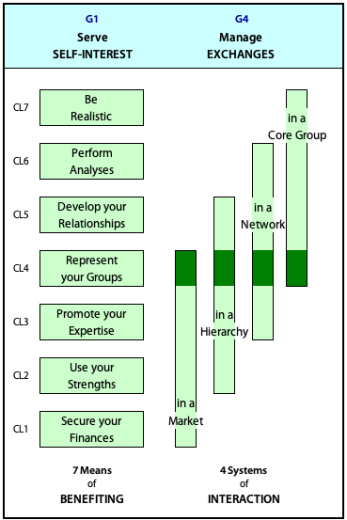
Exchanges via Interaction
To this point, you are able to exist in society. But that does not mean you are fully satisfied. No man is an island and wholly self-sufficient. We are all interdependent and others are invariably involved to some degree in providing what each of us wants.
To get needed or desired items or services, you have to interact with others. Of course, others are in exactly the same situation and they want to interact with you. In those interactions, if you give someone what they want, they will likely give you what you want either based on an economic or financial exchange, or through an innate urge for reciprocity.
Interaction and exchange are so central to human existence that academics have made it a primary focus.
Social Exchange Theory (SET) is a sociological and psychological framework proposed by George C. Homans and others which emphasizes that people interact by weighing the costs and benefits of their relationships. This framework has been applied widely, including to professional relationships, friendships, and romantic partnerships.
Anthropologists like Claude Lévi-Strauss have also emphasized the centrality of social exchanges in culture.
While self-interest and interdependence are core features of SET, their ramifications as proposed in THEE are not explored.
By adding one adjacent monad, 4 tetradic groups are formed, each of which represents a .
So the function of the tetrads is to have your wishes and needs satisfied,
Exchange brings to the fore a recognition that even a dyed-in -the-wool individualist must so often operate jointly, collectively, in tandem, together or mutually. The qualifier here, related to this , is proposed as «cooperatively». Both parties must voluntarily interact and find a way to gain from the exchange. Unless everyone feels their own self-interest is served, then the exchange will not happen and interaction may even break down.
Self-assertion here is expressed as generation of a presence to ensure you are recognized as a specific participant and contributor in the system.
In comparing the four tetrads the following factors appear to differentiate exchange and interaction:
Reciprocal Flows: what is exchanged.
Information Exchange: the characteristics of information.
Affiliation: the form of contact that occurs.
How it Goes Wrong: primarily due to power exercised at , and also where cooperation is required at .
Until now no specific form of benefiting has applied to all groups, but here ) is a requirement in all cases--but with a different quality in each case: competitive in the , resolute in the , passionate in the , and cooperative in the .
The 4 Tetradic Groups
G41: Exchanges in a Market
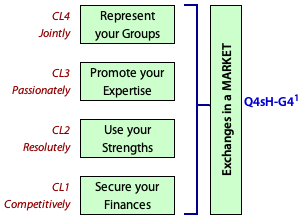
Function: To gain by meeting personal wants based on a joint willingness to transact.
In , there are buyers and sellers ...
... who compete in relation to the financial element i.e. costs, prices (). In transacting on either side, you resolutely use your strengths () e.g. reliability (if you are the vendor) or instant cash (if you are the purchaser). A degree of expertise is required to transact successfully regardless of which side you are on, and passionate promotion of this expertise () contributes to your market performance. Finally, you are not alone as either a buyer or a seller and everyone needs to cooperate with colleagues in representing their group ().
G42: Exchanges in a Hierarchy
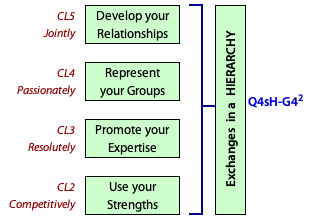
Function: To gain by joining in achievement based on a contract or convention.
In , there are superiors and inferiors...
who compete in relation to their strengths (): for example, the superior typically sees a bigger picture while the inferior is more informed about the actual situation; the superior has more authority but the inferior may have the backing of colleagues. There will also be competition amongst those at the same level in the hierarchy for certain tasks or for promotion.
Because achievement is crucial, you resolutely promote your expertise () and you are passionate in representing your group (), which may be your team or your function. Finally, you must develop your relationships () cooperatively with others in the hierarchy if you want to get anything done.
G43: Exchanges in a Network
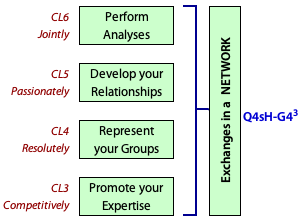
Function: To gain by being socially connected based on common values and interests.
In , there are acquaintances (colleagues, associates, friends)...
... who compete in relation to promoting expertise () while resolutely representing their groups (). The network will not function to serve you if your are not passionate in developing your relationships () by turning up and contributing to networking events. Finally, many in the network will be facing similar situations to yourself. So cooperatively working on analyses () and exchanging findings makes the network worthwhile.
G44: Exchanges in a Core Group
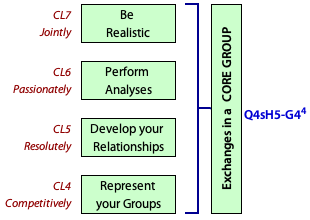
Function: To gain by enabling mutual concern based on inner convictions.
In , there are intimates (family, close friends)...
... who compete in relation to representing the core group (). However, in doing so, all members resolutely develop their relationships with each other (). All in the group must be passionate about performing useful analyses (), and must be cooperative in determining what is realistic ().
Transition
At this point you have positioned yourself in society and navigated society's 4 major systems of interaction; and this has enabled gainful exchanges and basic satisfaction of your specific wants and needs.
As a result, you are now faced with a much bigger challenge. You are fully aware the world does not revolve around you and that there are serious limits to the amount of control you have over what happens to you.
So: how can you address the complex social nature of your life for situations to evolve in ways that ensure you maintain the wealth and status to live the sort of life that you desire?
To meet this concern, the first step is to exert influence on others to go along with your preferences and needs.
This is made possible by adding one more adjacent level to form pentads.
- Continue with influence-G5 Pentads.
- Go to the review to see the full picture.
Originally posted: 10-July-2025. Last amended: 10-Oct-2025.
